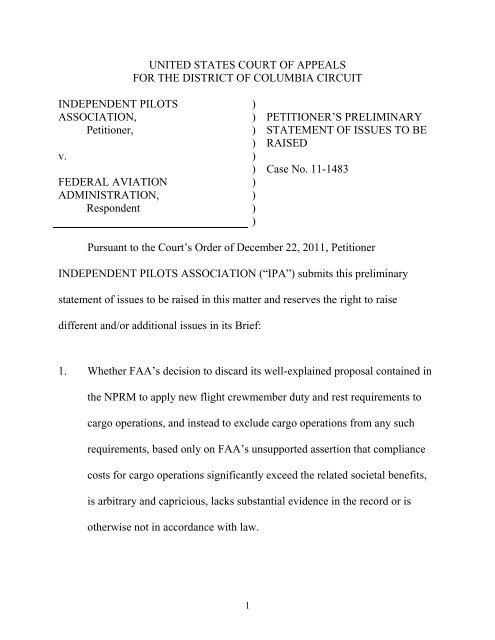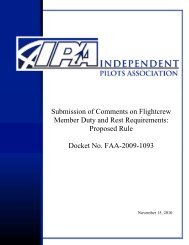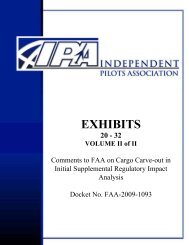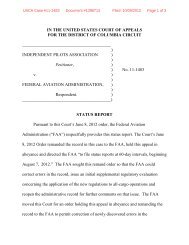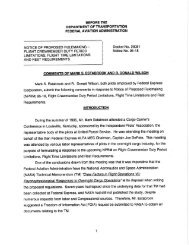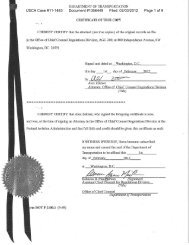Preliminary Statement of Issues to be Raised - Independent Pilots ...
Preliminary Statement of Issues to be Raised - Independent Pilots ...
Preliminary Statement of Issues to be Raised - Independent Pilots ...
Create successful ePaper yourself
Turn your PDF publications into a flip-book with our unique Google optimized e-Paper software.
UNITED STATES COURT OF APPEALS<br />
FOR THE DISTRICT OF COLUMBIA CIRCUIT<br />
INDEPENDENT PILOTS<br />
ASSOCIATION,<br />
Petitioner,<br />
v.<br />
FEDERAL AVIATION<br />
ADMINISTRATION,<br />
Respondent<br />
)<br />
)<br />
)<br />
)<br />
)<br />
)<br />
)<br />
)<br />
)<br />
)<br />
PETITIONER’S PRELIMINARY<br />
STATEMENT OF ISSUES TO BE<br />
RAISED<br />
Case No. 11-1483<br />
Pursuant <strong>to</strong> the Court’s Order <strong>of</strong> Decem<strong>be</strong>r 22, 2011, Petitioner<br />
INDEPENDENT PILOTS ASSOCIATION (“IPA”) submits this preliminary<br />
statement <strong>of</strong> issues <strong>to</strong> <strong>be</strong> raised in this matter and reserves the right <strong>to</strong> raise<br />
different and/or additional issues in its Brief:<br />
1. Whether FAA’s decision <strong>to</strong> discard its well-explained proposal contained in<br />
the NPRM <strong>to</strong> apply new flight crewmem<strong>be</strong>r duty and rest requirements <strong>to</strong><br />
cargo operations, and instead <strong>to</strong> exclude cargo operations from any such<br />
requirements, based only on FAA’s unsupported assertion that compliance<br />
costs for cargo operations significantly exceed the related societal <strong>be</strong>nefits,<br />
is arbitrary and capricious, lacks substantial evidence in the record or is<br />
otherwise not in accordance with law.<br />
1
2. Whether FAA’s (1) assumption that the only societal <strong>be</strong>nefits <strong>of</strong> applying<br />
the Final Rule <strong>to</strong> cargo operations relate <strong>to</strong> avoiding one fatal cargo accident<br />
instead <strong>of</strong> including non-fatal accidents and taxiing incidents and accidents,<br />
(2) estimate <strong>of</strong> the lost value <strong>of</strong> an aircraft hull as one-eighth the amount it<br />
uses as the estimated market value <strong>of</strong> an aircraft elsewhere in the<br />
rulemaking; and (3) understatement <strong>of</strong> <strong>be</strong>nefits relating <strong>to</strong> one fatal accident<br />
by failing <strong>to</strong> include the avoidance <strong>of</strong> costs, such as, without limitation, (a)<br />
the loss <strong>to</strong> shippers and recipients <strong>of</strong> the value <strong>of</strong> the packages and cargo<br />
aboard the aircraft, (b) the business loss resulting from delays in obtaining<br />
time-sensitive materials, such as critical components for infrastructure<br />
systems and manufacturing facilities, (c) potential lives lost from failure <strong>to</strong><br />
deliver critically needed medical supplies or equipment, as asserted by cargo<br />
carriers in the record, render FAA’s cost-<strong>be</strong>nefit analysis, and thus, the Final<br />
Rule’s exclusion <strong>of</strong> cargo operations, arbitrary and capricious, lacking in<br />
substantial evidence in the record or otherwise not in accordance with law.<br />
3. Whether FAA acted arbitrarily and capriciously or otherwise not in<br />
accordance with law by failing <strong>to</strong> provide an opportunity for interested<br />
parties <strong>to</strong> review and comment on FAA’s cost-<strong>be</strong>nefit calculations that were<br />
FAA’s sole basis for reversing its determination <strong>to</strong> include cargo operations<br />
2
within the scope <strong>of</strong> the proposed rule (NPRM) and exclude cargo operations<br />
from the scope <strong>of</strong> the Final Rule.<br />
4. Whether FAA’s decision <strong>to</strong> exclude cargo operations from the Final Rule is<br />
arbitrary and capricious, lacks substantial evidence in the record or is<br />
otherwise not in accordance with law when FAA had determined that (1) the<br />
prior regulations did not adequately address the risks <strong>of</strong> flightcrew fatigue;<br />
(2) the fac<strong>to</strong>rs that lead <strong>to</strong> fatigue should <strong>be</strong> regulated <strong>to</strong> ensure that<br />
flightcrew mem<strong>be</strong>rs do not accumulate dangerous amounts <strong>of</strong> fatigue; and<br />
(3) fac<strong>to</strong>rs such as night-time operations and flying across multiple time<br />
zones that exacerbate flight crew fatigue, and thus degrade flight crew<br />
performance, are more prevalent in cargo operations than in passenger<br />
operations that are covered by the Final Rule.<br />
DATED: January 23, 2012<br />
William C. Trent,<br />
General Counsel<br />
INDEPENDENT PILOTS<br />
ASSOCIATION<br />
3607 Fern Valley Road<br />
Louisville, KY 40219<br />
(502) 967-0341 ext. 2205<br />
(502) 753-3252 (fax)<br />
btrent@ipapilot.org<br />
By:<br />
/S/<br />
W. Eric Pilsk<br />
epilsk@kaplankirsch.com<br />
Thomas R. Devine<br />
tdevine@kaplankirsch.com<br />
KAPLAN, KIRSCH &<br />
ROCKWELL, LLP<br />
1001 Connecticut Avenue, NW<br />
Washing<strong>to</strong>n, DC 20036<br />
Telephone: (202) 955-5600<br />
Facsimile: (202) 955-5616<br />
At<strong>to</strong>rneys for Petitioner<br />
3
CERTIFICATE OF SERVICE<br />
I HEREBY CERTIFY that on this 23d day <strong>of</strong> January, 2012, I caused <strong>to</strong> <strong>be</strong><br />
served by ECF a true copy <strong>of</strong> the Petitioner’s <strong>Preliminary</strong> <strong>Statement</strong> Of <strong>Issues</strong> To<br />
Be <strong>Raised</strong> on all parties in this matter.<br />
_________________/S/________________<br />
W. Eric Pilsk<br />
5


